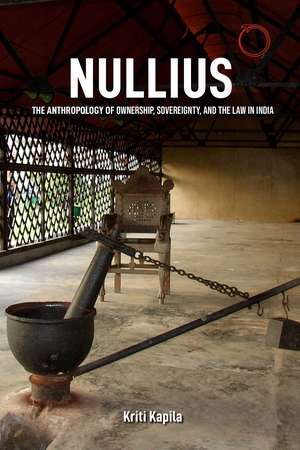Nullius: The Anthropology of Ownership, Sovereignty, and the Law in India
Autor Kriti Kapilaen Limba Engleză Paperback – 21 iul 2022
The book examines three forms of negation, where the Indian state de facto adopted doctrines of terra nullius (in the erasure of indigenous title), res nullius (in acquiring museum objects), and, controversially, corpus nullius (in denying citizens ownership of their bodies under biometrics). The result is a pathbreaking reconnection of questions of property, exchange, dispossession, law, and sovereignty.
Nullius is the winner of the 2024 Bernard S. Cohn Prize, Association of Asian Studies.
Preț: 154.93 lei
Nou
Puncte Express: 232
Preț estimativ în valută:
29.65€ • 30.63$ • 24.68£
29.65€ • 30.63$ • 24.68£
Carte disponibilă
Livrare economică 05-19 martie
Livrare express 18-22 februarie pentru 25.34 lei
Preluare comenzi: 021 569.72.76
Specificații
ISBN-13: 9781912808472
ISBN-10: 1912808471
Pagini: 150
Dimensiuni: 152 x 229 x 28 mm
Greutate: 0.4 kg
Ediția:1
Editura: HAU
Colecția HAU
ISBN-10: 1912808471
Pagini: 150
Dimensiuni: 152 x 229 x 28 mm
Greutate: 0.4 kg
Ediția:1
Editura: HAU
Colecția HAU
Notă biografică
Kriti Kapila is Lecturer in Anthropology and Law at King’s College London and is currently a Member in the School of School of Social Science, Institute for Advanced Study, Princeton. Her research interests include the anthropology of the state, technology, genetics, and India. Nullius is the winner of the Association of Asian Studies’ 2024 Bernard S. Cohn prize for first book.
Cuprins
Acknowledgements
Chapter 1. Nullius: An Introduction
Chapter 2. The Promise of Law
Chapter 3. The Truths of Dispossession
Chapter 4. Terra Nullius: The Territory of Sovereignty
Chapter 5. Res Nullius: The Properties of Culture
Chapter 6. Corpus Nullius: The Labor of Sovereignty
Chapter 7. Coda: The Illusion of Property
Index
Chapter 1. Nullius: An Introduction
Chapter 2. The Promise of Law
Chapter 3. The Truths of Dispossession
Chapter 4. Terra Nullius: The Territory of Sovereignty
Chapter 5. Res Nullius: The Properties of Culture
Chapter 6. Corpus Nullius: The Labor of Sovereignty
Chapter 7. Coda: The Illusion of Property
Index
Recenzii
"In this context, Nullius’ originality is to set the concept of dispossession (not necessarily the extant body of work addressing it, and for good reason) as the counterfactual to that of the gift; its success is to take the ethnographic imagination the whole nine yards to flesh out the theoretical possibilities of this counterfactual that could have easily remained a superficial witticism."
"A far-reaching theoretical—and ethnographic—feat for anthropology at large. Animating the breadth of scholarship that animates it, this book sets free the concept of property to reconfigure some startling legacies of the dispossession implied. A profoundly original composition of multiple dispossessions transforms the concept: ‘property' is never going to be quite the same again."
"Kriti Kapila's study of sovereignty in India brilliantly connects the strange absence of the right to property, in the Indian Constitution, to the special relationship between sociality, (dis)possession, sovereignty and exchange in everyday life. This highly original ethnography of the Indian state reveals the distinctive cultural logic of its ability to recode hierarchy as relationality."
"Kapila slices through decades—centuries!—of political thought to provide a distinct and consequential new grasp of sovereignty, detailing its foundation in modes of ownership that range from the brutally real to the tragically illusory. Starting with a shockingly neglected question— what is the obverse of the hau of the gift?—this daring book pushes us to ponder the hidden scaffolding of state sovereignty."
"Kapila’s work reveals the many depths of state-led dispossession beyond a grid of monopolized violence and political economic calculations... Its key contributions are in showing how an anthropology of the state can be revived outside of Agambenian-Foucauldian frameworks that animate much of the recent work on sovereignty and state-subject relations. Kapila’s commitment to an anthropological grounding produces a welcomed and refreshing piece of scholarship at a moment when many of us are wading into the waters of transdisciplinary work."
